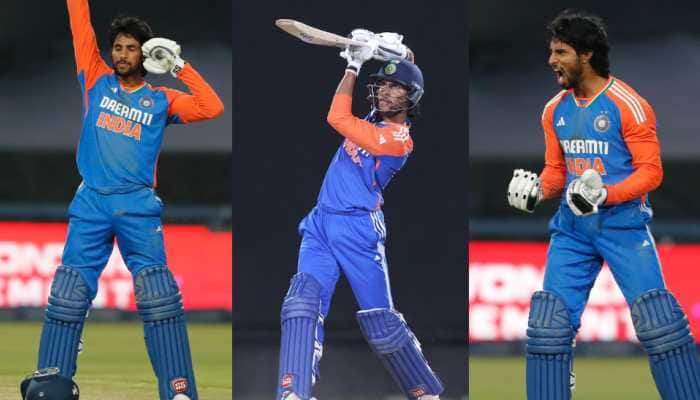Hijab row: Muslim students protest ban as Karnataka High Court resumes hearing
The full bench of the Karnataka High Court, comprising chief justice Ritu Raj Awasthi, justice Krishna S Dixit and justice JM Khazi is hearing arguments challenging the ban on wearing hijab in Karnataka schools.
Trending Photos
) Pic for representational use only
Pic for representational use only Bengaluru: The Karnataka High Court on Wednesday resumed hearings on the petitions filed in connection with the ongoing row over wearing hijab in schools and colleges across the southern state.
The full bench of the Karnataka High Court, comprising chief justice Ritu Raj Awasthi, justice Krishna S Dixit and justice JM Khazi is hearing arguments challenging the ban on wearing hijab in Karnataka schools.
As the hearing began in the high court, some Muslim students refused to remove the Hijab and said that they will not attend the schools without a hijab.
We came to attend classes but they (school admin) asked us to remove Burqa & Hijab on entry. We were ready to remove Burqa but will not remove Hijab, says a student pic.twitter.com/oSKdvQXWru
— ANI (@ANI) February 16, 2022
Lingaraj Angadi, SJMV College for Women in Hubli today declared a holiday after some students said that they'll not come without Hijab.
Karnataka| Today we've followed the High Court's (interim) order in which it is clear that they (students) have to follow the dress code. But some students said they'll not come without Hijab...so we've declared a holiday: Lingaraj Angadi, SJMV College for Women in Hubli pic.twitter.com/6H7KsOQiCy — ANI (@ANI) February 16, 2022
Continuing his arguments on behalf of two students from Kundapura college in the high court on Tuesday, senior advocate Devadatta Kamat stated that India's Constitution follows positive secularism, not like Turkish secularism, which is negative secularism. He added, ''our secularism ensures that everyone's religious rights are preserved.''
During the hearing on Monday, Kamat, appearing for the petitioner, had submitted before Karnataka HC that the Government Order (ban on hijab) is a non-application of mind. He said this ''GO (government order) is in the teeth of Article 25 and it is not legally sustainable.''
Kamat also said that Muslim women are allowed to wear headscarves in Kendriya Vidyalaya. He added that ''this is a case where students have been wearing a headscarf for years together.''
Driving his point home, Kamat said as far as core religious practices are concerned, they come from Article 25(1) & that it is not absolute. Advocate Kamat added "if core religious practices harm or offend public order then it can be regulated.'' Kamat maintained, "The question is where is that law on the basis of which the headscarf is prohibited."
To which, the Karnataka High Court asked Kamat whether what all has been stated in Quran is essential religious practice? Replying to it, Kamat said, "I am not saying that." The petitioners argue that according to Quran, it is a 'farz' (duty) to wear hijab. Students are seeking to wear hijabs of the same colour as their uniforms.
The petitioners have urged the court to allow girls to attend classes in hijab and continue their education while the government argued that it would be necessary to find whether the hijab is essential in Islam. Last week, the high court had restrained students from wearing hijab or any other religious attire until further orders.
Chief Minister Basavaraj Bommai had on Tuesday said that everyone should abide by the Karnataka High Court order on hijab row. He said this after attending the business advisory committee meeting of the state Assembly.
Chief Minister Bommai also expressed confidence that peace and normalcy will prevail. He had also said that a decision regarding the reopening of Pre-University and Degree colleges will be taken after assessing the situation.
High schools in Karnataka reopened on Monday after being shut from last Wednesday following untoward incidents in parts of the State over the hijab row. Section 144 of the Criminal Procedure Code has been imposed in sensitive areas in the districts of Udupi and Dakshina Kannada, and Bengaluru.
In the Udupi district, high schools reopened on Monday with Education Department sources saying that attendance was normal in all the institutions. Muslim girl students who reached the school campuses wearing hijabs removed them before entering classes.
Police personnel have been posted in Udupi town and near the schools to maintain law and order and to avoid any untoward incident. The Udupi district administration imposed Section 144 of CrPC around the 200-metre radius of all high schools in the district from Monday till February 19 to maintain peace.
Udupi Tahsildar Pradeep Kurudekar, who visited a few schools, said Muslim students are abiding by the High Court's interim order by removing hijabs before entering classes.
Stay informed on all the latest news, real-time breaking news updates, and follow all the important headlines in india news and world News on Zee News.
Live Tv







)
)
)
)
)
)
)
)
)
)
